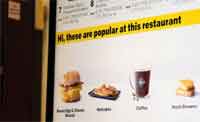| |
|
| |
|
 |
Supply
Chain by the Numbers |
| |
|
| |
- Oct. 24, 2019 -
|
| |
|
| |
|
| |
|
| |
California Considering Electric Truck Mandate; Amazon Battling Expired Food Sellers; ATA Says Freight Volumes Solid in September; McDonald's Investing Big in AI |
| |
|
| |
| |
| |
| |
50% |
|
That is the proposed new mandate in the state of California for the percent of new heavy and medium trucks that must be electric vehicles by 2030, in proposed new rules from California's Air Resources Board (CARB). Many trucking groups are arguing that the new rules will it will impose heavy costs on trucking firms and will be too hard to meet. For example, "A 50% transformation is unrealistic in the next decade," said Joe Rajkovacz, government affairs director for the Western States Trucking Associations."While we've been aware that environmentalists desire this type of transformation, there are practical issues such as there is absolutely nothing available in the marketplace currently proven to meet the performance requirements of the industry," Rajkovacz added. Meanwhile, environmental groups said the new rules don't go far enough to reduce CO2 emissions quickly. The Advanced Clean Truck rule, if adopted by the Board in Spring 2020, would require truck manufacturers to sell zero-emission trucks at an increasing percentage of their yearly California sales from 2024 through 2030. Most truck manufacturers are spending heavily to bring all-electric trucks to market.
|
|
|
| |
| |
|
|
|
That was the somewhat surprisingly strong year-over-year gain in September in the Freight Tonnage Index from the American Trucking Associations, according to data released this week. The month over month gain, however, was basically flat, up 0.2%. Still, the September number should help to allay concerns about a imminent recession, as freight movements often predict later economic changes up or down. The ATA index came in at a level of 117.6, meaning trucking freight tonnage is up 17.6% since the baseline year of 2015. For the entire third quarter, the index was up 1.2% over the previous quarter and 4.5% from a year earlier, both nice gains, the ATA said. The index is also up 4.1% year-to-date compared with the same period last year. |
| |
| |
|
| |
| |
$300 Million |
 |
That's how much McDonald's spent earlier this year to acquire Dynamic Yield, an Israeli company that developed the artificial intelligence tools now used at thousands of McDonald's drive-throughs, as the fast food giant makes moves to go high tech to go with burger flipping. McDonald's has even established a new tech hub in the heart of Silicon Valley - the McD Tech Labs. According to an article this week in the New York Times, the chain is now using AI to drive digital menu boards programmed to market its food selection more strategically, taking into account such factors as the time of day, the weather, the popularity of certain menu items and the length of the wait. On a hot afternoon, for example, the board might promote soda rather than coffee. At the conclusion of every transaction, screens now display a list of recommendations, nudging customers to order more. At some drive-throughs, McDonald's has tested technology that can recognize license-plate numbers, allowing the company to tailor a list of suggested purchases to a customer's previous orders. Already, the recommendation algorithms have generated larger orders, the McDonald's says.
|
| |
| |
| |
| |
| |
|
|
|
| |
 |
 |
| |
|
|
| |